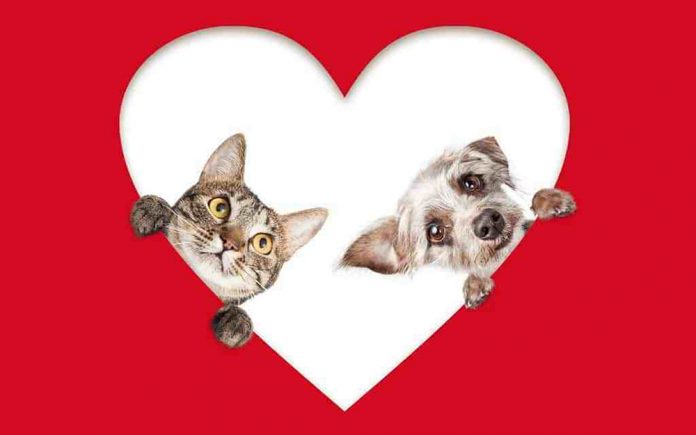
By Janet McAfee
This week we celebrate Valentine’s Day, grateful for the love in our lives including the unconditional love provided by our 4-legged companions. During the pandemic, we are more likely to celebrate this special day at home rather than dining out. Fido and Fluffy may linger under the table hoping for a morsel to drop. Pet hazards are common when our normal routine changes, and pet parents must be extra vigilant during this holiday.
After a glass or two of celebratory champagne, folks may forget about putting away snacks and candy that can pose a danger to their pets. Boxes of Valentine chocolates sit on kitchen counters and in candy dishes on coffee tables. The top Valentine danger to dogs is chocolate, in particular the dark chocolate and truffles-type candies. Some people might not realize that all types of candy may be lethal for their hovering dogs and cats.
Cats and dogs cannot metabolize candy like humans. Chocolate contains caffeine and a compound called theobromine which can be toxic to pets depending upon the dose and the animal’s size. Both of these substances can speed up their heart rate and in high concentrations can cause vomiting, diarrhea, or even death. Other symptoms of chocolate poisoning are digestive upset, restlessness, hyperactivity and trembling. Cats’ sense of taste is not as drawn to sweets foods, and therefore they are not as likely as dogs to gobble up a box of chocolates.
If you suspect your pet ate candy or other harmful substance, contact your veterinarian immediately. Veterinary offices tend to be busy during the days after all holidays, when access to certain rich foods causes medical problems for animals. Call them for advice before you plan to induce vomiting.
Xylitol, a sugar substitute found in some sugarless gums and candies, can also be very harmful to dogs and cats. (This substance, favored by dieters, can also pose health risks to humans!). If your dog ingests Xylitol, symptoms initially include vomiting, weakness, and lack of coordination. Ultimately, the substance can cause hypoglycemia, seizures, and liver failure. A pack of sugarless gum inside your purse could create a major medical problem for your pet. With their excellent sense of smell, dogs can detect unseen treats in sealed bags inside backpacks and purses.
The simple solution is to keep Valentine candy secured in a location way above the animal’s reach. A motivated dog can acquire the ability to scale high counters to reach a dish of candy or a marinated steak. Containers with a secure lid will reduce the tempting smell and prevent problems.
What’s inside all those wrappers isn’t the only problem. The containers and wrappers themselves can be harmful, and dogs may ingest the bag along with the candy inside. This can result in bowel blockage or at the very least, stomach irritation.
Other foods from holiday meals may also be hazardous. Raisins, grapes, macadamia nuts, avocados, onions, garlic, and unbaked bread dough are among pet toxins found in the kitchen. Unfinished alcoholic drinks are another source of potential harm to your animals. Fatty table scraps should be avoided, no matter how many longing looks you get from Fido.
However, not all human foods are toxic to our pets. A small amount of canned pumpkin can actually aid their digestion (pet stores carry special canned pumpkin for dogs). Apples are an excellent source of phytonutrients that support their overall health. Cooked lentils provide dietary fiber, supporting heart health and a healthy digestive system. A small portion of steamed and chopped green vegetables provide another healthy treat.
When you open Valentine gifts, don’t forget the dangers that packaging may pose. Cats love to jump inside bags, but when they dart out the handle can get caught around their necks, creating terror and possible choking. Cut handles off bags for Fluffy to enjoy them. Dispose of any plastic wrapping and packaging as animals tend to lick plastic. Many plastics are derived from petroleum products that can harm your animals when ingested. Keep plants out of reach, and research which ones pose a danger.
“Stranger danger” can be an issue if you are dating a new gal or guy coming over for the first time. You might have other guests arriving who forget to keep entry doors closed, or trip over small animals underfoot. Carefully introduce your pets to everyone. Your potential love match will be tested by how he or she relates to your “furkids”! If a pet is especially skittish, it’s wise to keep them safely secured in a back room for the evening.
For immediate assistance and advice, contact the Pet Poison Helpline at (800) 213-6680, www.petpoisonhelpline.com. With Valentine’s Day occurring on Sunday, there is only one local emergency veterinary hospital in the Coachella Valley. VCA Valley Veterinary Hospital is open 24 hours a day, 7 days a week, located at 46920 Jefferson Street near highway 111 in Indio. Keep their phone number, (760) 342-4711, in your cell phone case of any pet medical emergency.
May you all have the special love in your life that a dog or cat can provide. If you are still “dogless” or seeking a special kitty, check out the list of rescues and shelters below.










































